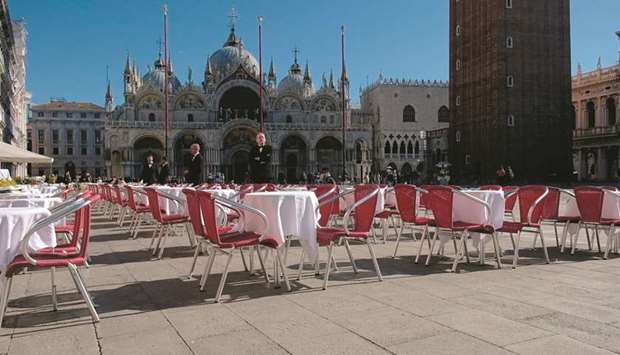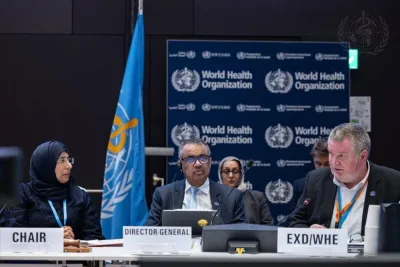The World Health Organisation declared yesterday that the new coronavirus epidemic was at a “decisive point” as countries across the globe battled to contain the deadly outbreak.
Saudi Arabia banned pilgrims from visiting Islam’s holiest sites as the number of deaths jumped in neighbouring Iran, while Japan and Iraq ordered the closure of schools.
Alarm is growing as China is no longer the only breeding ground for Covid-19, with other countries including South Korea and Italy becoming hotbeds of infection, raising fears of a pandemic.
“We’re at a decisive point,” WHO chief Tedros Adhanom Ghebreyesus told a press conference in Geneva. “If you act aggressively now, you can contain this virus, you can prevent people getting sick, you can save lives.”
The virus has already killed more than 2,760 people, mostly in China – where it first emerged in December – and infected more than 81,000 in over 45 countries.
But there are now more daily cases being recorded outside China, raising fears that poor countries with weak health infrastructures would not be able to cope.
“It’s what’s happening in the rest of the world that’s now our greatest concern,” Tedros said.
World financial markets have plunged on fears that widespread lockdowns could hamper business activity and dent global growth, while sports matches and festivals have been cancelled to try to stem infections.
The EU said it was bracing for an economic hit, with tourism already feeling the pinch and supply chains reliant on China also being affected.
And President Emmanuel Macron said France, the world’s most visited country which has recorded two deaths, was preparing for a jump in cases.
“We are facing a crisis, an epidemic that is coming,” he said.
Several governments have advised against travel to Italy – Europe’s epicentre with 528 cases and 14 deaths.
In Latin America’s first case, a 61-year-old patient in Brazil had travelled to Italy.
Other countries including Algeria, Denmark, Romania and Spain have also reported infections linked to Italy.
But Rome hit back, with Foreign Minister Luigi Di Maio slamming “false reports” abroad about panic, cities in lockdown and runs on supermarkets, saying they were “doing more damage than the risk of an epidemic”.
The WHO’s Tedros said all countries should ensure their health systems were prepared. “We are actually in a very delicate situation in which the outbreak can go in any direction based on how we handle it.”
The authorities in the western German state of North Rhine Westphalia meanwhile reported 14 new infections of the coronavirus.
The cases are in the district of Heinsberg, situated near the Dutch border.
Earlier, hundreds of people were quarantined in their homes in the area after a kindergarten teacher, who had attended a Carnival event, was confirmed as infected with the virus.
The total number of cases in Heinsberg now stands at 20.
Meanwhile, some 130 guests were cleared yesterday to leave a Tenerife hotel placed on lockdown after four cases of the coronavirus were detected there, but Spanish authorities did little to allay concerns of the close to 600 tourists who will remain there.
On the third day of the H10 Costa Adeje Palace Hotel’s lockdown, only the widespread presence of protective masks gave a glimpse of how unreal life has become for those inside the compound.
A video from inside the hotel showed guests sunbathing by one of the swimming pools and others serving themselves at a restaurant buffet.
Some, but not all, wore masks, lowering them while eating.
Lara Pennington from Manchester, staying at the hotel with her children and elderly in-laws, said basic safety measures such as wearing masks and washing hands regularly were being ignored.
“There are numerous people who are not adhering to the protocol and therefore the environment outside of our rooms still remains very unsafe for us. We have no intention of leaving our rooms,” she said.
Carlota, a volunteer nurse, told Reuters: “What we are really afraid of is that other people could be infected. Supposedly in healthy people it is not a deadly virus. We should not have any problem.”
A spokesman for the regional government said none of the remaining guests presented any symptoms and they might be cleared before the end of a 14-day isolation period imposed on Wednesday.
“A decision has been made that frees the hotel from the presence of 130 people,” he said in televised comments.
Other guests appeared more concerned about being stuck on the hotel grounds.
“Everything is quite surreal, 95% of the situation remains normal here but we feel encapsulated,” Christopher Betts, from Leicestershire in England, told Reuters by telephone. “We kill the time by walking around, reading a bit, sitting by the pool.”
The hotel, which has said it is co-operating with authorities, did not respond to requests for comment, including on who would ultimately pay for the forced extended vacation.
The coronavirus can spread via droplets in the air when an infected person coughs, sneezes or breathes out, and these can also contaminate surfaces such as door handles and railings.
Spain’s total number of active coronavirus cases rose to 25 yesterday from 11, with the bulk of them linked to Italy.

Waiters stand by an empty restaurant in Venice’s St Mark’s Square, which would usually be full of tourists, as a coronavirus outbreak continues to grow in the country.


